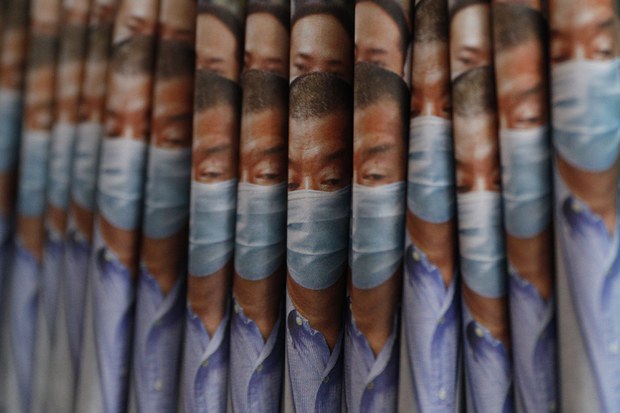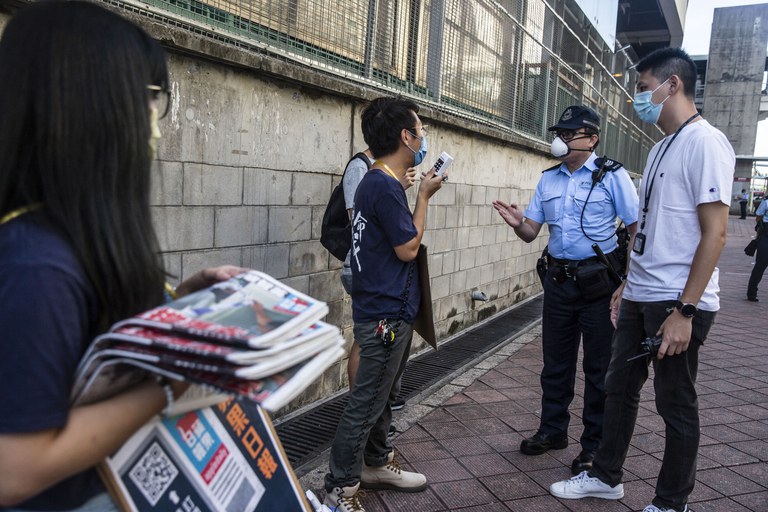China ‘gutted’ press freedom in Hong Kong, sparking exodus of journalists: report
Share

In this Aug. 11, 2020 photo, copies of the Apple Daily newspaper, featuring Hong Kong media tycoon Jimmy Lai, displayed for sale at a newsstand in Hong Kong.
As ruling Chinese Communist Party (CCP) leader Xi Jinping lauded his government for bringing “order from chaos” with a citywide crackdown on dissent in the wake of the 2019 protest movement, an international journalists’ group said press freedom has been “gutted” in the former British colony.
The International Federation of Journalists (IFJ) said it was deeply concerned at the “gutting” of independent media and press freedom in Hong Kong, and called on governments worldwide to put pressure on the authorities to uphold freedom of speech in the city.
“The IFJ and its affiliates have watched the dramatic collapse of press freedom and independent media in Hong Kong over the past two years since Beijing imposed its so-called national security law,” the group said, citing the closure of at least 12 independent news organizations including the Apple Daily newspaper since the national security law took effect on July 1, 2020.
“Many media workers and activists [have been] arrested, threatened and imprisoned amid a brutal crackdown on civil society and the media,” the group said.
Its report, titled “The Story That Won’t Be Silenced: Hong Kong Freedom of Expression Report,” accuses the Hong Kong authorities of “weaponizing” the law to take down the city’s free and independent media, targeting journalists under the national security law and colonial-era sedition laws.
The report, which used to be published annually by the Hong Kong Journalists’ Association (HKJA), describes an “urgent situation facing journalists in Hong Kong” and calls on governments to offer more visa programs to help them leave the city and live overseas.
It said that while Hong Kong journalists and news outlets are reestablishing themselves overseas, where they can write and comment free from political reprisals, the exodus has left the city with a lack of independent, on-the-ground reporting, making it harder for the international community to know what is going on there.
“Many journalists who have dedicated their lives to the ideals of press freedom and the people’s right to know have been forced to flee, self-censor or submit to years in prison for simply doing their job,” the report said.
“The irony is not lost on anyone that [this] annual report can no longer be published inside Hong Kong,” it said.


Xi hails crackdown
It said the HKJA itself is under growing political pressure, and changed its constitution in June 2022 to make dissolution easier, in case this is needed.
The HKJA website was still available on Tuesday, but hadn’t been updated since Sept. 8, and didn’t feature the annual report.
Speaking at the 20th party congress in Beijing on Sunday, Xi Jinping hailed the crushing of Hong Kong’s democracy movement following the 2019 protest movement in the city as a major achievement for the CCP.
“Faced with a turbulent and volatile situation in Hong Kong, we effectively took over the comprehensive governance of the Special Administrative Region … bringing order out of chaos,” Xi told delegates.
He appeared to signal that the authorities would continue to rein in political expression in Hong Kong, saying the Beijing-backed political system installed by the CCP in the now tightly controlled city is still “incomplete.”
Lam Yin-bong, former assignment editor for the now-shuttered pro-democracy site Stand News, said he founded his own news platform ReNews in April 2022 after losing his job when the organization folded, as a small counterweight to the pro-China mainstream media.
“The public needs access to relevant information, even if they have different political standpoints,” Lam told RFA on Monday. “They need other views to balance their own perspective, so they can see things in a broader way, not just one-sidedly.”
“This is what I want to achieve.”
‘Pretty obvious’ situation
Lam said he set up the modest news page because he loves to report the news, and had no way to pursue the stories he wanted to write working for pro-China outlets.
But he still runs the risk of being targeted under the national security law, which carries heavy penalties for anyone seen as “inciting hatred or dissatisfaction” with the authorities.
“It’s hard to make much of a splash under the current decree,” Lam said. “To put it bluntly, why would anyone set up a large organization in the expectation that it could be pulled or blocked at any time?”
“It would be tantamount to inviting the police to keep an eye on you, or even investigate you.”
Lam said it was hard to operate at a small scale too, however.
“When you have so little in the way of human resources, it limits what you can do, and therefore also limits how influential you can be,” he said.
HKJA chairman Ronson Chan said the organization hadn’t participated in this year’s press freedom report, and that it has no plans to produce future reports.
“It’s pretty obvious what the current situation regarding freedom of the press is in Hong Kong,” Chan said.
Translated and edited by Luisetta Mudie.







